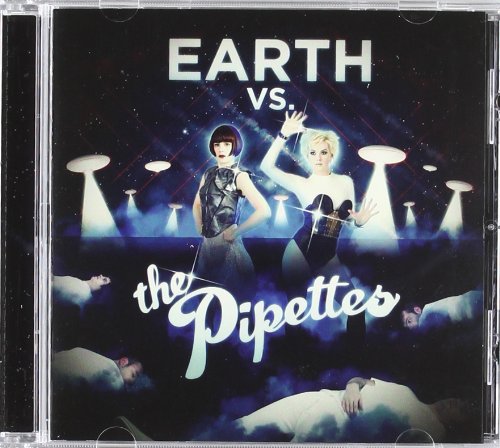
The Pipettes
Earth vs. the Pipettes
Release Date: Nov 16, 2010
Genre(s): Pop, Pop/Rock, Alternative/Indie Rock, Alternative Dance
Record label: Fortuna Pop
Music Critic Score
How the Music Critic Score works
Album Review: Earth vs. the Pipettes by The Pipettes
Acceptable, Based on 8 Critics
Based on rating 8/10
So many changes have taken place since the release of the Pipettes' previous album that sorting it out is just too much of a pain. All you really need to know is that members of the group have come and gone and their sound has changed from girl group imitators to disco-pop acolytes. The constant behind the group, songwriter and ringleader Monster Bobby, is still there, still calling the shots on Earth vs.
Based on rating 6.4/10
The Pipettes are like the Menudo of indie pop with an ever-changing lineup that seems to rotate its membership every 12 months. For their second album, the girls—once a trio of chic, cheeky vocalists in matching polka-dot dresses—have slimmed themselves down to a duo, and they’ve given up their ‘60s pop pastiche for a sound that’s more Bananarama than Phil Spector. Earth vs.
Based on rating 6/10
It’s been said that nostalgia is the most dangerous and seductive of human emotions. In his classic novel of consumerist paranoia, White Noise, Don Delillo’s neurotic sidekick Murray Jay Siskind called it a byproduct of fear and rage. And even a casual observer of history could note that nostalgia often reaches a ferocious peak when there’s a sense of foreboding lurking in the collective future.
Based on rating 60%%
Originally crafted as an experiment in reviving the Phil Spector “girl group” sound, The Pipettes slid onto the scene in 2006, all polka-dot dresses and sideways glances. Spunky and oozing playful energy, their poppy tunes were instantly likeable. In the last few years, however, the group’s revolving door of members has reduced their number to just two: sisters Gwenno and Ani Saunders (neither of whom were original members, although Gwenno was involved in the making of their debut album).
Based on rating 2.5/5
What worked about the Pipettes’s debut record, We Are the Pipettes!, was how they took their ‘50s- and ‘60s-era girl group gimmick and infused it with a contemporary point of view and production sheen. If not as artistically rich as Amy Winehouse, the Pipettes at least appeared to be onto a similar notion of how to mine a retro aesthetic. A slew of lineup changes later, and the Pipettes have returned with Earth vs.
Based on rating 2/5
The Pipettes are back! Kinda. They’ve done the full [a]Sugababes[/a], see: having rotated through all their original members, instead of three girls from Brighton playing ’60s-tinged twee-pop, the carousel has stopped at second album time on two sisters from Cardiff intent on making a ‘space disco’ record. The irony of a self-described ‘self-manufactured’ pop group deconstructing itself would have Roland Barthes popping a lung, but that brief delectation aside, even Martin Rushent – the man who made the [a]Human League[/a]’s [b]’Dare'[/b] – can’t add enough bells and whistles to stop the tunes from sounding like they’ve been faxed over from one of Stock & Aitken’s duller days at the office.
Based on rating 3.2/10
The 1960s girl groups went overlooked for so long in part because of their failure, often through no fault of their own, to establish successful long-term careers as album artists. We remember the young women featured on essential box sets like Phil Spector compilation Back to Mono or Rhino's more recent One Kiss Can Lead to Another not for their full-lengths or their larger-than-life exploits, but for their singles. In some cases, as with the Crystals, the artists you heard singing over your car's AM radio weren't even the same ones who came to town to perform.
Based on rating 3/10
Lineup changes are never an easy thing. Whether band members have irreconcilable differences due to a conflicting artistic vision, or can simply no longer put up with each other’s demands, the ones who suffer through all this strife are the listeners. Considered as “manufactured pop” from the get-go, it shouldn’t really matter if The Pipettes brand name changes from time to time.

